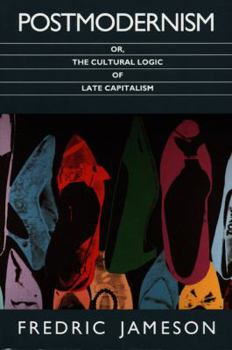Postmodernism, or, The Cultural Logic of Late Capitalism
Select Format
Select Condition 
Book Overview
Now in paperback, Fredric Jameson's most wide-ranging work seeks to crystalize a definition of "postmodernism". Jameson's inquiry looks at the postmodern across a wide landscape, from "high" art to "low" from market ideology to architecture, from painting to "punk" film, from video art to literature.
Format:Paperback
Language:English
ISBN:0822310902
ISBN13:9780822310907
Release Date:January 1992
Publisher:Duke University Press
Length:460 Pages
Weight:1.76 lbs.
Dimensions:1.4" x 6.1" x 9.3"
Customer Reviews
5 ratings
Impressive
Published by Thriftbooks.com User , 16 years ago
Jameson's book is, if the subject is somewhat redundant some 18 years after publication, altogether proving of Jameson's brilliance, not merely in his critical analysis of attitudes toward the visual arts and men of letters, but in his synopsis of philosophical and cultural underpinnings of this phenomenon. He is somewhat scathing but fair in his treatment. I highly recommend this impressive volume to anyone--willing to take on the challenge--seriously interested in recent culture and arts critique.
Not for those lacking in vocabulary
Published by Thriftbooks.com User , 17 years ago
A thorough, yet occasionally vague study of postmodernism. Jameson's flowery, somewhat esoteric writing style should be wrestled with care, as your journey through this book will most likely be met with more dead ends and re-readings than an actual elucidation of the topic, as the words "Yeah, okay...but what does that mean?" will probably pop into your head from time to time. Of course, the author is a distunguished critic and writer, and the book reflects that. However, if your aim is to get a brief review or critique on what postmodern is, search elsewhere.
mind stretching
Published by Thriftbooks.com User , 24 years ago
Being an engineer, I prefer not to be carried away with my use of words, but this book just makes, channels the reader talk, think, again talk on it in the ways he/she is not very used to. Nevertheless, this is a good exercise in the broadest sense of the word for everybody. It should be so actively read that I can even recommend it to those who would like to lose weight.
mind stretching
Published by Thriftbooks.com User , 24 years ago
Being an engineer, I prefer not to be carried away with my use of words, but this book just makes, channels the reader talk, think, again talk on it in the ways you are not very used to. Nevertheless, this is a good exercise in the broadest sense of the word for everybody. It should be so actively read that I can even recommend it to those who would like to lose weight.
An Amazing Book, For Those Who Can Read It
Published by Thriftbooks.com User , 27 years ago
"Postmodernism" is one of those words many of us have heard somewhere, but something we know little about, which includes myself. But since I have read Jameson's book, among a few others on this notoriously confusing topic, let me at least tell you what I think about the book. To begin with, this is not a book for those who are new to the subject. This has to do not just with the extremely complicated nature of postmodernism as a topic, but Jameson's style of writing itself, which produces sentences that at times can run more than half a page, if not more. Reading Jameson's work can be something like climbing Everest with a jeep on your back, as a friend of mine recently commented. It is difficult to imagine an intellectual (perhaps with the exception of the psychoanalytic theorist Jacques Lacan) in the past thirty years who is more difficult to understand than Jameson. Yet, those who are able to endure Jameson's arrogant, intricate writing style will easily see why his book on postmodernism is one of the best written on the subject. Jameson begins his work with an intricate reading of a painting by Van Gogh and contrasts it to Warhol's "Diamond Dust Shoes," the former as the symptom of a typical "modernist" work and the latter as a prime example of a "postmodernist" one. His main argument in the important opening title essay and throughout the book is that around the late sixties to the early seventies, cultural representation and production has experienced significant changes and that these changes must be accounted by even more significant changes in history itself, history being understood here with the Marxian notion of "the mode of production" or, to put it crudely, the socio-economic system. I will not go into the details of this argument, which are too complex to discuss here; but what is amazing about Jameson's work is the sheer depth of his intellectual capabilities, which offers detailed analyses of architecture, video, economics, film, literature, and so forth into all corners of culture, within the context of our recent history, followed by his daunting, one-hundred page conclusion on a number issues to consider in future studies of the postmodern. Even if you do not agree with Jameson's argument, much less his Marxist critical approach, you will no doubt be amazed by Jameson's seemingly endless cultural inventory. If you are a follower of Marxist theory or cultural theory in general, you will be equally impressed with the ambition of Jameson's intention, which is nothing less than to present a totalizing historical perspective on postmodernism and postmodernity. Anyone interested in postmodernism or Marxism must read this indispensable text. The only problem is if you can.Peter Song, recent graduate in English and Comparative Literature at UNC Chapel Hill





